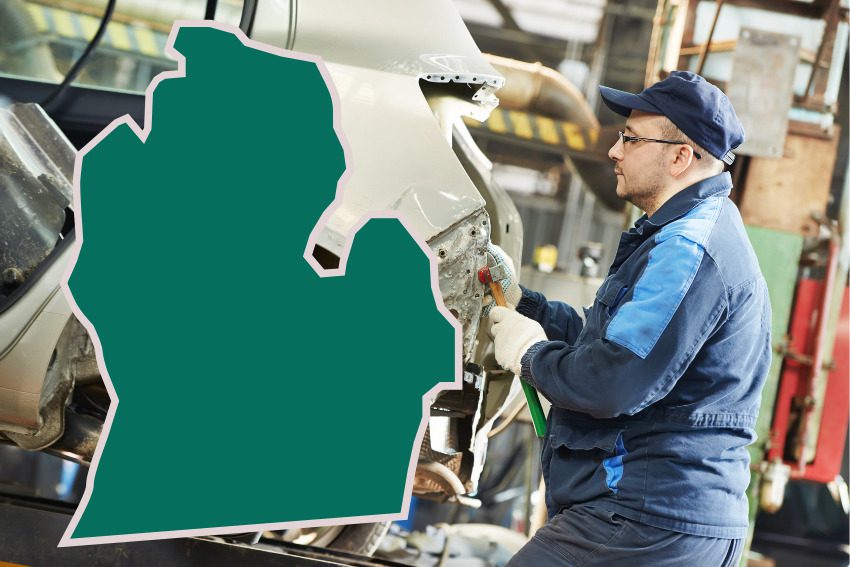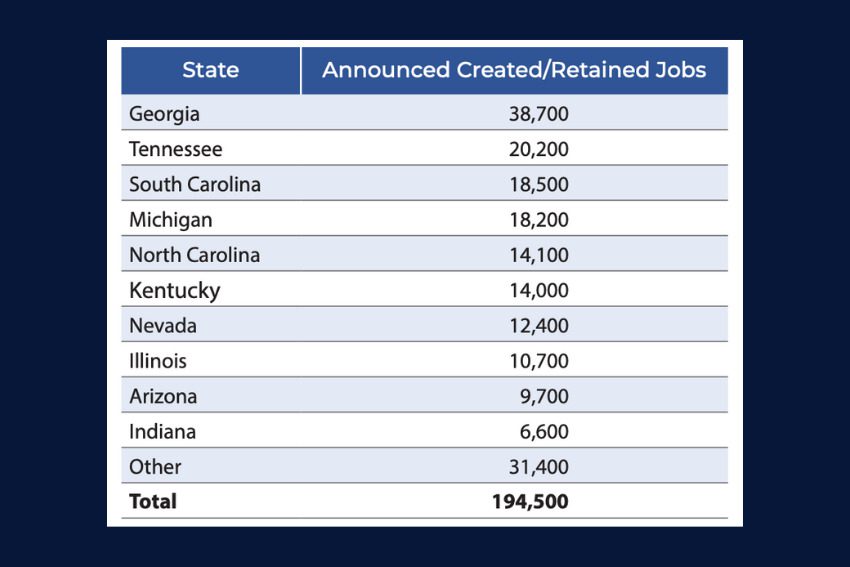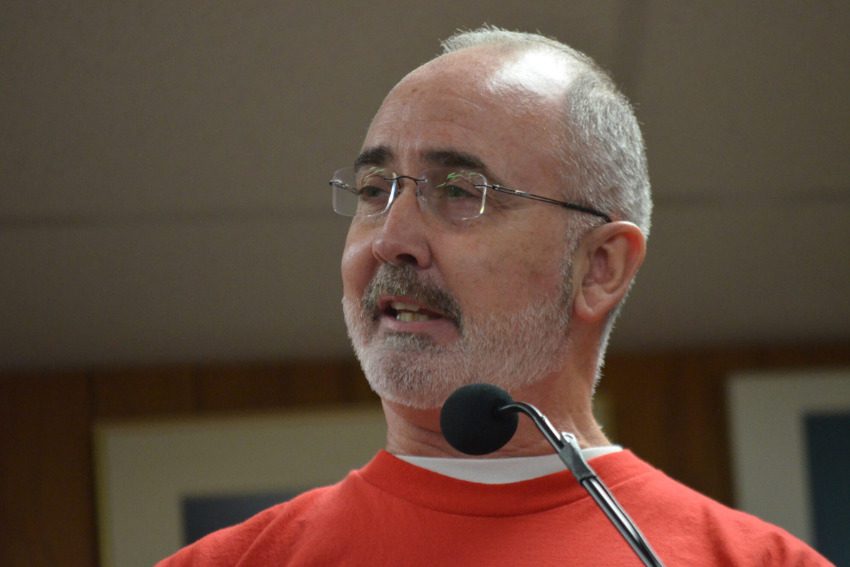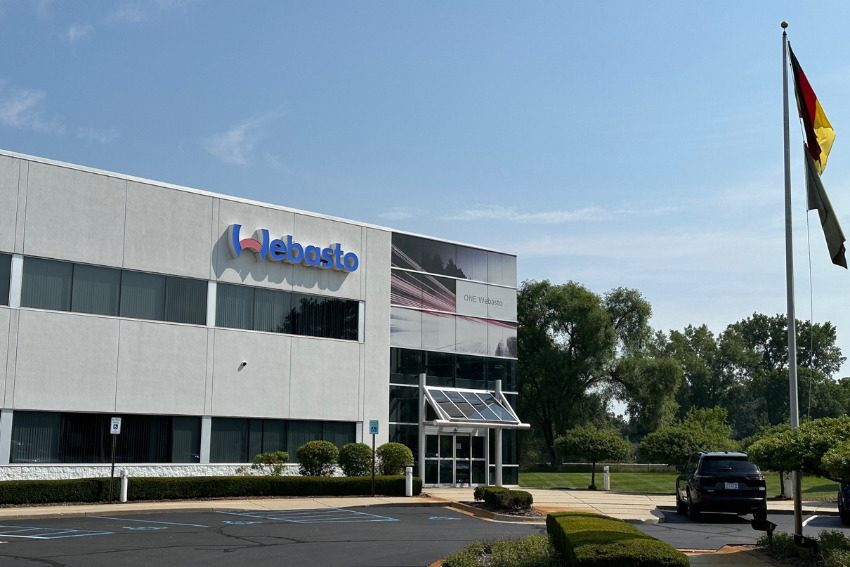
A recent analysis shows that federal policies and legislation have dramatically expanded investments in electric vehicle and EV battery manufacturing—especially in Michigan.
MICHIGAN—Manufacturers have invested nearly $200 billion in electric vehicle and EV battery manufacturing facilities nationwide over the last decade, creating or retraining nearly 200,000 jobs along the way, according to a recent report from the Environmental Defense Fund.
And thanks to federal policies from the Biden-Harris administration that have dramatically expanded and accelerated those clean energy investments over the last two years, Michigan is bringing in a significant share of those new jobs—with thousands more still en route.
The recent report found that $188 billion in EV-related manufacturing investments have been announced nationwide since 2015—with the vast majority of them receiving federal support through the passage of either the Inflation Reduction Act or the Bipartisan Infrastructure Law.
And the state of Michigan, which has long served as the biggest automotive manufacturing hub in the US, is reeling in the lion’s share of those investments with at least $20 billion in new projects announced over the last nine years, along with at least 18,200 new or retained jobs.
“Michigan is at the forefront of the clean energy revolution, driven by our strong manufacturing capabilities, innovative enterprises, and unprecedented federal support,” Gov. Gretchen Whitmer said in a statement this month. “These landmark federal resources are propelling our transition to electric fleets and clean energy; generating tens of thousands of well-paying, high-skill jobs; boosting advanced manufacturing across the state; and propelling our economy.”
Here’s the deal:
Last year, the Environmental Defense Fund tracked $120 billion in announced investments in EV vehicle and battery manufacturing nationwide over the previous eight years. The latest report shows those investments have soared more than 50% over the last year to $195 billion.

At least 61% of the announced EV investments included in the recent report were announced after the passage of the Inflation Reduction Act—which incentivized manufacturers to invest in the state and create more clean energy jobs. All told, 82% of the EV-related projects were also announced following the passage of the Bipartisan Infrastructure Law, according to the report.
Those EV-related investments have sparked 195,000 announced or retained jobs nationwide. And Michigan is home to 18,200 of them—marking more new EV-related jobs than nearly every other state tracked in the recent report, except for Georgia, Tennessee, and South Carolina.
Here’s the full breakdown:

Where are the jobs?
Coming.
The recent Environmental Defense Fund report is tracking “announced” jobs—not necessarily full-time positions that have been filled—as many EV- and battery-related manufacturing projects in Michigan are still under construction or remain in the early planning stages.
But the American EV Jobs Alliance is tracking at least seven major EV-related manufacturing projects across Michigan that account for the majority of those newly announced jobs—including in Lansing, Marshall, Big Rapids, Holland, Orion Township, and Van Buren.
Among the biggest clean energy projects announced in Michigan over the last two years:
- The planned $3.5 billion Blue Oval Battery Park in Marshall, with 1,700 jobs;
- Ultium Cells’ upcoming $2.6 billion battery plant in Delta Township, with 3,200 new jobs—hundreds of which were recently filled at a widely attended job fair, and;
- Gotion’s planned $2.4 billion gigafactory in Big Rapids, with 2,350 new jobs.
Other clean energy projects recently announced in Michigan include:
- Our Next Energy’s new $1.6 billion factory in Van Buren Township, with 2,100 jobs and where thousands of batteries are already being produced for the automotive industry;
- General Motors’ planned $200 million facility in Auburn Hills, with 1,000 jobs, which is set to be housed inside the former (and soon-to-be renovated) Palace of Auburn Hills;
- Shyft Group’s planned $16 million expansion in Charlotte, with 680 new jobs, most of which will be focused on the production of all-electric commercial delivery vans;
- Fortescue Metals’ upcoming $35 million manufacturing center and engineering workspace in Detroit, with 600 jobs, where officials expect to begin production of automotive batteries, fast chargers, and other EV components in 2025;
- and four separate manufacturing expansion projects from Magna that are set to create another 1,700 new jobs in Auburn Hills, Detroit, Shelby Township, and St. Clair.
Are they union jobs?
Mostly.
During a recent forum in Ann Arbor, US Energy Secretary Jennifer Granholm said that Michigan’s union workers have (and will continue to have) a big role to play in the nationwide transition to clean energy—including when it comes to manufacturing EVs and EV batteries.
Under federal law, non-union companies cannot be precluded from applying for federal grants and loans for clean energy, so not all of the companies that have received them are unionized.
But Granholm said the federal selection process has been heavily weighted in favor of unionized labor—including by requiring projects to include exceptionally strong labor standards, which include detailed labor agreements to ensure all workers are paid at competitive rates.
“We’re not allowed to force those who seek grants and loans to unionize, but we can be persuasive,” Granholm said. “We are building in America. We’re not sitting by anymore.”
Is Michigan ready?
According to the World Resource Institute, as many as 56,000 more EV-related manufacturing jobs could arrive in Michigan over the next 16 years, and the state is poised to see as many as 167,000 new clean energy jobs in total over the next decade, according to recent estimates.
Whitmer rolled out a new state office this year to help ensure Michigan workers are prepared for those jobs as they arrive—including opportunities for tuition-free college and paid skills training.
Granholm also recently announced a $5 million federal investment for the Biden-Harris administration’s Battery Workforce Initiative to support new training programs for EV battery assembly, which Whitmer said will be key to ensuring Michiganders are prepared for new jobs.
That momentum, of course, could change depending on the outcome of this year’s election.
Data shows the Biden-Harris administration has overseen the creation of about 16 million new jobs since taking office—including 420,000 new jobs in Michigan, with about 24,000 jobs in manufacturing. During Trump’s time in White House, Michigan lost about 280,000 jobs.
House Republicans have already passed legislation to repeal the Biden-Harris administration’s clean energy plan, and ex-President Donald Trump has promised to begin peeling back clean energy investments on “Day 1.” Project 2025 also clearly details plans to repeal both the Inflation Reduction Act and the Bipartisan Infrastructure Law under a second Trump presidency.
READ MORE: Michiganders save thousands on EVs through Inflation Reduction Act
For the latest Michigan news, follow The ‘Gander on Twitter.
Follow Political Correspondent Kyle Kaminski here.
Support Our Cause
Thank you for taking the time to read our work. Before you go, we hope you'll consider supporting our values-driven journalism, which has always strived to make clear what's really at stake for Michiganders and our future.
Since day one, our goal here at The 'Gander has always been to empower people across the state with fact-based news and information. We believe that when people are armed with knowledge about what's happening in their local, state, and federal governments—including who is working on their behalf and who is actively trying to block efforts aimed at improving the daily lives of Michigan families—they will be inspired to become civically engaged.


Nurses and other caregivers at UMH-Sparrow vote overwhelmingly for pre-strike authorization
BY JON KING, MICHIGAN ADVANCE MICHIGAN—Approximately 2,000 nurses and healthcare professionals at the University of Michigan Health-Sparrow voted...

Corewell nurses vote to join Teamsters union
BY JON KING, MICHIGAN ADVANCE MICHIGAN—With nearly 60% of the vote, nurses at eight hospitals across Southeast Michigan have voted to unionize....

Planning Commission takes step to prep land for massive new manufacturing project near Flint
The Mundy Township Planning Commission is clearing the way for what could become one of Michigan’s largest manufacturing operations—with reports...

Fain rallies with Stellantis UAW members at Trenton plant ahead of strike authorization vote
BY KEN COLEMAN, MICHIGAN ADVANCE MICHIGAN—Union members and elected officials rallied on Wednesday against Stellantis arguing that the automaker...

Pro-union group requests investigation of Webasto for alleged anti-union efforts at Detroit plant
BY JON KING, MICHIGAN ADVANCE MICHIGAN—A German-based auto parts manufacturer is facing another complaint about alleged union busting activities at...







